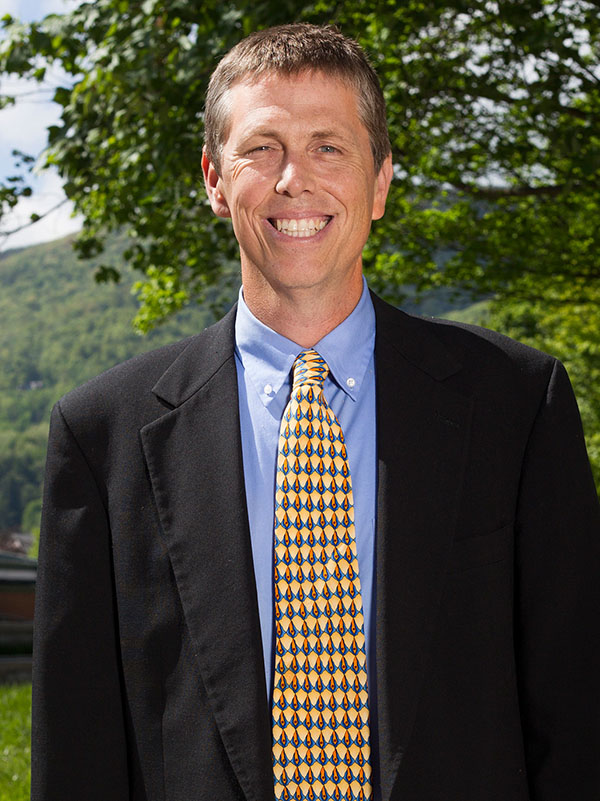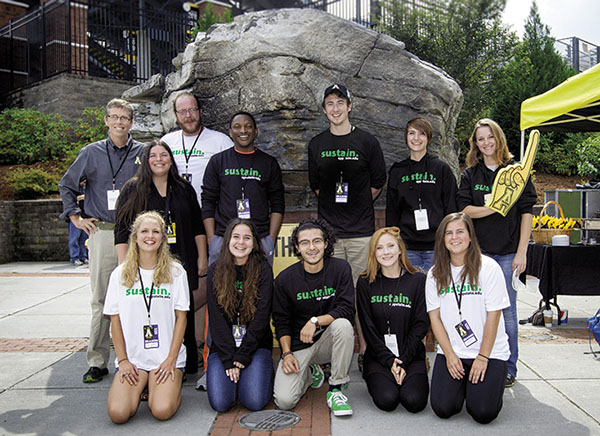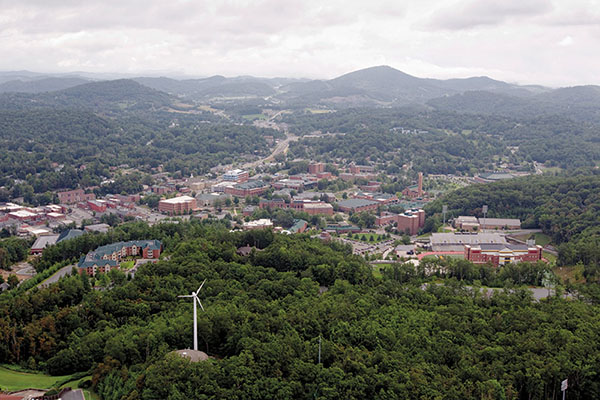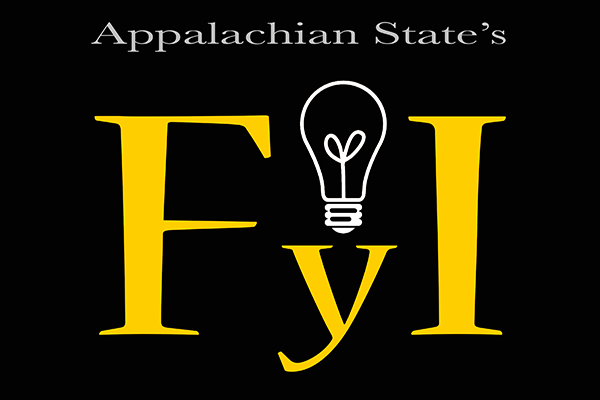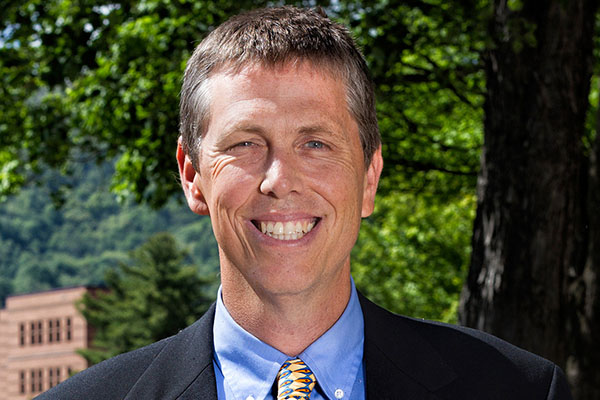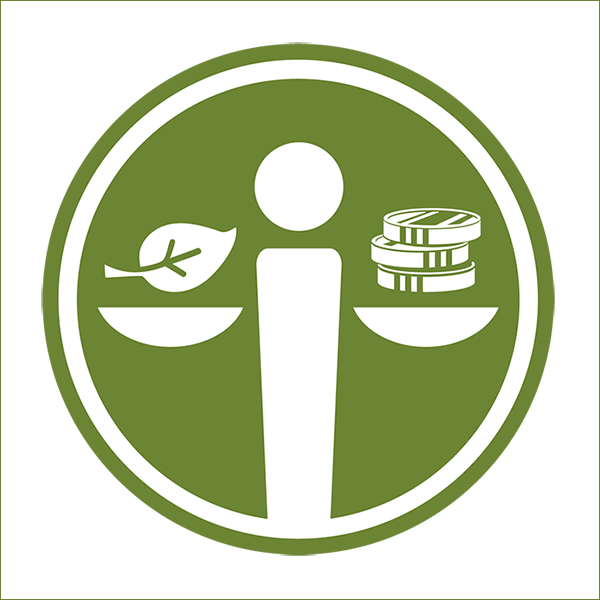Dr. Lee Ball, Interim Director of Sustainability at Appalachian, discusses Appalachian's current sustainability initiatives.
Transcript
Megan Hayes: Dr. Lee Ball who is Appalachian’s new University Sustainability director joins me in the Podcast studio. Lee thanks so much for being here today!
Lee Ball: I’m happy to be here. Thanks for having me.
MH: Well I’m really glad you’re here today because people who know you know your long-standing commitment to sustainability. Not only in your lifestyle but also as your research specialty area and you’ve taught sustainability for nearly fifteen years here at Appalachian. You’re a founding member of Appalachian’s Living Green residential learning community. You bring so much to this new role that you have here at Appalachian. That’s one of the reasons that I’m really excited to talk to you today is because while you’re transitioning to this new role Appalachian is transitioning into a new role with sustainability. Our focus on sustainability is really broadening. The way we’re thinking about the concept of sustainability and the approach that we’re taking institutionally is broadening and deepening and so I’m wondering if you can talk a little bit about that.
LB: Sure. I’d be happy to. This is such an exciting time at ASU related to sustainability and all of our efforts. We have such a long history related to sustainability going back decades and decades really back to the beginning of the institution back when we had a farm out at State Farm Parking Lot. You’re right the notion of sustainability is kind of a moving target that is evolving. I like to say that it’s a process that we’re all trying to see how we fit in the sustainability realm if you will. Sustainability …the definition is something that a lot of people struggle with. We really don’t spend a lot of time trying to define what it is. We spend a lot of our time trying to help people figure out how they’re going to connect in their profession…in their life…in their office. It’s a lot easier to speak about sustainability in that regard. It is such a broad topic. It really touches everyone on campus in some way. There is no one that is isolated out there that doesn’t relate to sustainability. It’s really easy for us in our office to go and meet people and find out what they do and then help them figure out how they connect to sustainability.
MH: Yeah, that personalized approach works so well with so many things. It’s a lot of the way that we are used to interacting with the world too. I know you do that with faculty in the classroom. Don’t you have faculty on as advisors? Is that how it works with the Sustainability office? They help with integrating sustainability into the classroom? How does that work?
LB: We’ve been involved with faculty for a long time with our sustainability efforts on campus. Most of these programs started as academic programs and we currently have an outreach fellow. Tammy Kowalczyk in the College of Business in accounting. She has been a fellow with our office for two years and her primary responsibility is to help with the academic integration part of what we do in our office. We’re involved with a lot of faculty on campus. The sustainability council is made up of faculty staff and students. A lot of faculty that engage in that council are able to learn about what everyone’s doing in the different areas of sustainability and take it back to their departments and colleges and share that knowledge and those resources. So it’s not lost on us, the importance of faculty in this process because we have so many experts here on campus and national and international leaders.
MH: You talked a little bit about our history and that grassroots environmentalism and how we started there. Part of the process is us really talking more about not just the environmental piece but also the other two “E’s” Economic and Equity. Keeping in mind that we have this history that really goes back to the beginning of our institution, how does that environmentalism and that environmental approach really inform the other two “E’s “ in terms of how we’re thinking about social equity issues and economic sustainability.
LB: Right. We’re defined by our environment in so many ways her at Appalachian State University because it’s so beautiful and the sense of place here is something that we all cherish. It’s natural for us to rally for the environment and to really value it strongly. It’s also natural for us to value the people and the living things that coexist within the environment. This community here in Western North Carolina and specifically the High Country has a long history of resiliency. The people have learned how to survive with very little. That’s kind of the core of sustainability in a lot of ways. I think that contemporary sustainability thought elevates the people and social part. Right along with that a subset of an equitable society is a thriving, strong and flourishing economy that supports the society. When everything is somewhat in balance then everyone is happy…the environment and the people.
MH: So, do you think that in some ways this history that we have or the way that we’re viewing sustainability through this environmental lenses and we do that not only here at the university but this is a national approach that we’re taking. This current dialogue that really emphasizes global warming and renewable energy and clean water….those types of things that we’re talking about now….do you think it makes it harder or easier for us to talk about issues of economic disparity or cultural diversity and social equity issues…does it cloud the issue there or do you think that it opens it up more?
LB: I think that it definitely opens it up and makes it easier because all these issues are so out in the open these days…whether it’s climate refugees or even with the shootings that we’ve seen across the country. People are not happy and people are angry because maybe potentially they feel marginalized. Maybe they are simply struggling to put food on the table. Maybe they really are a climate refugee and they have to move because of climate change. This is really happening in parts of the world. These issues are so frequent and they are in the news everyday. It’s really easy to use these as examples when we’re trying to relate it back to sustainability.
MH: Lets bring it a little closer to home now. What are some of the initiatives that you are excited about moving forward in the coming semester and the coming year?
LB: There is a lot going on in The Office of Sustainability. If you haven’t visited us there it’s in the basement of East Hall across from Stick Boy so everyone is welcome to come and visit us there. We have a lot to report on. We’re starting out second year of the zero waste initiative in the Football stadium. At all of our football games the goal is to be zero waste. We’re excited about getting better at that and kind of expanding that into the field house a little bit. We have a team of outreach interns that we are hiring to be on campus frequently so that the students faculty and staff can understand what we do and really a big job of our office is to tell the stories of the people on campus and what they’re doing related to sustainability so we’re out there talking about equity and we’re going to be talking about the environment and zero waste and triple bottom line economics and art and all of the different way that you can tap into sustainability. We’re starting a green office certification program. This is hot off the press. Maybe your office can be one of the first ones to certify.
MH: Yeah. Tell us about that.
LB: Like LEED for new construction, there is going to be standards and criteria of thing that you can do to make the office environment more sustainable. We’re going beyond recycling. Some things we may not be able to control like changing lighting. Many building on campus are being retrofitted with lighting but there are other policies related to paper and water use that we can help influence. The standards may have a couple of levels like certified or gold. LEED uses gold and platinum. We will probably come up with something a little more creative than that. Maybe the Yosef level or something like that. When you partner with us, we’ll have people come and help you figure out how to do it and once you get certified you’ll get some sort of recognition and we’ll push it out through all of our different forms of media and probably give you a certificate to hang on your wall somewhere.
MH: That is very cool! Can you talk a little bit about the sustainability literacy program that you’re doing with incoming freshmen?
LB: Sure, This is very exciting. We’re in our second year of a new strategic plan called The Appalachian Experience: Envisioning a Just and Sustainable future. The idea of the sustainability literacy project is to assess the knowledge, behaviors and attitudes of our campus community. We’re going to have a series of surveys that will go out to incoming students, both transfer and freshmen and the same with faculty and staff. In addition to that we’ll have some qualitative interviews and focus groups maybe that will occur in the fall. Going forward we will survey them again toward the end of the strategic plan to see if we’ve moved the needle. To see if knowledge has changed, if attitudes have changed and if behavior has changed. It’s just a way to measure what we’re doing.
MH: What kind of specific things are you measuring on the surveys and focus groups? What kind of things are you asking them?
LB: It’s very diverse so you can imagine with how deep and broad sustainability is we’re going to be asking them questions about climate change and we’ll be asking them questions about their behaviors related to recycling and maybe their attitudes related to climate change and behaviors related to energy efficiency…and on and on and on…the challenge has been to shorten the survey.
MH: I’m sure. That’s a really exciting project.
LB: It is. We look forward to getting the results and seeing what we have.
MH: I’m just interested in you talking a little bit about personally what is really exciting to you as you think about having this new role here at Appalachian. What do you see in our future?
LB: it has been so much fun meeting people on campus and getting to know what they do. It’s such a large community here. I’ve heard peoples names and didn’t really know exactly what they did…you know…being a faculty member. I get to listen to what they want and need from us and our role is really to help them tell their story. That’s something that we say over and over that we welcome people to contact us so that we can help them figure out how they connect to the overall sustainability initiative on campus. One of the greatest parts of my job is that our leadership supports us so strongly. Knowing that we have that support makes our job a lot easier than some of my peers at some of the other institutions that have this role. They struggle with an army of one sometimes and a very small budget or no budget and they are trying to do the things we do. The physical plant is so supportive and we have an energy manager and an energy analyst in Jerry Marshall and Patrick Richardson and many people that have my job as University Sustainability Director or Chief Sustainability Officer also do energy management for their campuses. We are really lucky that we have integrated sustainability at very deep and high and broad level here at Appalachian State University. It’s just really an exciting time to be here. It’s an important time because the issues related to sustainability are serious and we can’t just be complacent and sit here as a bystander. We all have to participate and so we’re just trying to get people engaged and involved and to be a part of the Appalachian experience. The office of sustainability has a great team. We have a communication specialist that is in charge of all of our marketing and communication. This is the person that is telling the stories on campus. They are the ones that are getting our message out to not just the campus community but also the local community and the national community. If anyone has a story related to sustainability contact us and we can really help get it out there for you. That’s our job. They work closely with your group here (University Communications) and you all have always been so supportive. In addition we have Jennifer Maxwell, our conservation specialist on campus. She is in charge of the zero waste project. Our zero waste initiative has a goal to divert 90% of our campus waste by 2022. That’s a daunting figure for us on the ground trying to think about out how we’re going to do that.
MH: So when you say divery, does that mean divert it from the landfill?
LB: Exactly. That’s waste conservation speak. That means we all need to find out when we’re throwing something away…We need to know what away is and we need to know the right receptacle to put it in and the largest part of zero waste is the upstream part of it so we’re thinking about maybe not buying certain things or we’re buying things that are recyclable or that can be used again. It’s not an afterthought. It’s more upstream instead of downstream. We also have a data and analytical specialist. His name is Jim Dees. He is involved with a lot of the data related to energy and renewable energy and some of the large reporting systems that we use on campus. One of those is called STARS or Sustainability Tracking Assessment and Ratings System. It’s a national benchmark that campuses are allowed to use to basically see how they are doing related to sustainability initiatives and it’s very diverse. It covers everything from divestment to energy use to lighting and …
MH: I mean it sounds like what it allows you to do really is compare apples to apples…to use a clichéd term but you’re really able to tell…since this is something that is sort of hard to put your finger on sometimes and your really continually evolving and discussing and changing what we’re looking at, by using STARS you have a common platform and can have those discussions around it. That seems like it would be really helpful.
LB: Right. We’ve learned that it’s often not apples to apples because all of the campuses are so different but we all naturally compare each other anyway.
Both: (laughter)
LB: So we’ve learned to compare ourselves more like with our conference and we compare within our state and compare with peer institutions. We traditionally have done really well. We’re in the process of getting our final score. I hesitate to let everyone know what that is at this point but I will say that it’s a high gold score and there is only one other school in the country that has achieved a platinum score but we have a high gold score and we have a whole lot to be proud of.
MH: I’ll let you reveal that next time you’re here. You mentioned a little bit about the faculty that you have working directly with your office. Can you talk some more about just what that looks like…the faculty that your working with through the Office of Sustainability because it looks like obviously you’ve got these great connections on staff that are helping meet these initiatives. How are we doing that in the classroom?
LB: Well, first of all, the faculty are just to large to name all of them. We work with Chris Thaxton in Environmental Science…the chair of that program and he was been really interested with the academic integration piece in addition to Jeff Ramsdell and Shea Tuberty in Biology. There’s Tammy Kowalczyk in the College of Business and these people have been extremely supportive when it comes to figuring out, “How can we bring the classroom successes into the limelight? “ What we’re finding out is that we’re already doing academic integration. We’re just not really leveraging it very well and we’re not telling the stories very well and we’re not categorizing them and getting them on our website so that people can know what other people are doing in other departments. It’s just so exciting once you dig deep onto the department and program level you realize that we’re making change and students are involved every step of the way and we just have these amazing faculty and it’s just another really fun part of my job is to get to work with these people. Also there is Karen Trefz. She is our office manager. She is kind of…we call her our den mother and Karen is the person that will probably answer the phone when I’m not there and she can connect you to the right person in our office. If you need to talk to someone related to something specific. She knows exactly who to talk to
MH: I have one more thing I want to get in. Can you talk a little bit about the role of the Sustainability Council on campus and what their role is for our campus and what they have been working on?
LB: Yes. The, “What they have been working on” is a long story because the sustainability council is made up of numerous subcommittees. So we have a grants and funding subcommittee and a curriculum and research subcommittee and a housing and dining and energy and data and assessment and transportation and kind of on and on. This group meets three times a year and as I said before they are made up of faculty staff and students. We encourage students to come and all of our meetings are open to the public so we advertise them on our website and we encourage the entire campus community to come to the meeting so they can kind of just see what’s going on. I also encourage people that are not engaged with this group to contact us and if you have an interest to see how you might become engaged. The best thing about the Sustainability Council in my opinion is that it’s really helped deal with the disconnect that has been present on campus related to sustainability so when you get people into a room and people have the opportunity to report on what all of the subcommittees are doing everyone gets a chance to say, “Oh…okay that kind of connects to me in this way. Maybe I’ll contact them,” or “wow that’s really interesting. I didn’t know that was going on.” This council has really galvanized and integrated sustainability into the fabric of the university.
MH: You can find information about all of the projects that you’ve talked about today on your website which is…
LB: http://sustain.appstate.edu
MH: Dr. Lee Ball thank you so much for being here today. You talked about how your role on campus is to listen and share stories and I’m really glad that you were able to come and let us listen to you and that we will be a small part in helping share the stories that you’re trying to share as well so thanks for being here today.
LB: Well thank you very much it was my pleasure.
What do you think?
Share your feedback on this story.
About Sustainability and Energy Management at App State
Appalachian State University’s leadership in sustainability is known nationally. The university’s holistic, three-branched approach considers sustainability economically, environmentally and equitably in relationship to the planet’s co-inhabitants. The university is an active steward of the state’s interconnected financial, cultural and natural resources and challenges students and others think critically and creatively about sustainability and what it means from the smallest individual action to the most broad-based applications. The university offers both undergraduate and graduate academic degree programs that focus on sustainability. In addition, 100 percent of Appalachian’s academic departments offer at least one sustainability course or course that includes sustainability, and all students graduate from programs that have adopted at least one sustainability learning outcome. Learn more at https://appstate.edu/sustainability.
About Appalachian State University
As a premier public institution, Appalachian State University prepares students to lead purposeful lives. App State is one of 17 campuses in the University of North Carolina System, with a national reputation for innovative teaching and opening access to a high-quality, cost-effective education. The university enrolls more than 21,000 students, has a low student-to-faculty ratio and offers more than 150 undergraduate and 80 graduate majors at its Boone and Hickory campuses and through App State Online. Learn more at https://www.appstate.edu.
